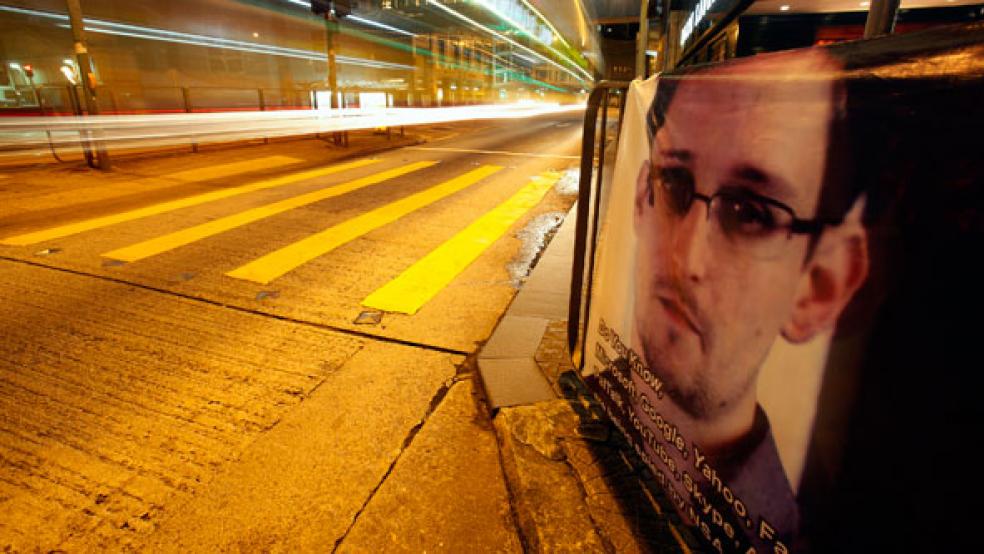In central Moscow Tuesday, Russian attorney Anatoly Kucherena announced that he was assisting NSA leaker Edward Snowden with his asylum application to stay in the country.  He said Snowden, who has been holed up in Moscow's airport for three week, was comfortable and looking forward to having the Kremlin review his application.
He said Snowden, who has been holed up in Moscow's airport for three week, was comfortable and looking forward to having the Kremlin review his application.
"While all procedural questions are being decided, he will remain in the transit zone of the airport," Kucherena said, noting that it could take up to three months to process the application. "He is satisfied with how he is being treated by the employees of the airport."
Kucherena who was among the activists that recently met Snowden is one of Russia’s top lawyers. He has worked on high-profile cases around the world, including some that involved human rights. Snowden could have made a worse choice.
But Kucherena is more than just a lawyer. He’s also a member of the public council of Russia's Federal Security Service, the vast security apparatus that evolved from the KGB. The council’s purpose is to improve relations between the FSB and the general public, but critics say it’s just a puppet operation meant to identify dissent (its members are approved by the head of FSB). Kucherena also has close ties to Russian President Vladimir Putin, openly supporting him in his presidential bid last year.
In one sense, Snowden’s choice of Kucherena is a shrewd one. The lawyer has the ear of the president, and might be able to move things along more quickly.
But it also reveals Snowden’s mind-boggling naiveté. He is asking for asylum in a country that continues to openly squash dissent, often using violent tactics. Putin runs the country with an iron fist, has jailed people who oppose him, and has chased others out of the country. Opponents have been known to meet early deaths, often under suspicious circumstances.
What’s more, the history of U.S. citizens fleeing to Russia does not bode well for Snowden. Others who have fled to Moscow have returned home after short stays. Others have disappeared completely.
“Vladimir Putin oversaw the swift reversal of former President Dmitry Medvedev’s few, timid advances on political freedoms and unleashed an unprecedented crackdown against civic activism," Human Rights Watch said of Russia in its most recent report on abuses there. "New laws restrict nongovernmental organizations, undermine freedoms of assembly and expression, and discourage international advocacy. New local laws discriminate against lesbian, gay, bisexual, and transgender people."
PUTIN’S HEAVY HAND
Putin, a former KGB agent, used blunt force to rise to power after former President Boris Yeltsin left office. He created powerful networks of former spies and installed them in the Russian government and in Gazprom, the state-controlled energy giant that bankrolled Putin’s rise to the top.
Rivals who challenged Putin were jailed. Mikhail Khodorkovsky and Platon Lebedev, chiefs of Yukos, a Gazprom rival, were jailed in 2005 on trumped up charges, and remain locked up today.
Others like former KGB agent Alexander Litvinenko and robber baron Boris Berezovsky fled the country, but both met untimely ends. Litvinenko was poisoned with radioactive polonium and died in the United Kingdom in 2006. His widow accused the FSB of staging a hit. Berezovsky was also found dead at his home in the UK earlier this year. Authorities said he committed suicide.
Russian journalists are also under constant threat; according to the Committee to Protect Journalists, 56 have been killed since 1992. Last week, a reporter who criticized the government was killed in Dagestan. There were numerous attempts on the life of Anna Politkovskaya, a prominent journalist who often clashed with the president. The assassins finally succeeded in 2006, when she was gunned down in the elevator of her Moscow apartment. Her murder remains unsolved.
At the same time, political groups that oppose Putin are routinely targeted by security services. Their protests are met with violence from law enforcement. Security forces also have targeted gay and lesbian groups, NGO’s, and religious leaders that clash with the Kremlin.
According to Freedom House, Russia is simply not a free country.
"Putin and his adherents have launched a series of initiatives designed to close down civil society and eliminate any and all potential threats to his grip on power," Freedom House president David J. Kramer and Eurasia program director Susan Corke found in a recent report on Russia. "Arrests, arbitrary detentions, and home raids targeting opposition figures are occurring on a level not seen since Soviet times."
CHECKERED PAST
The history of Americans who have sought refuge in Russia is also dubious. Lee Harvey Oswald defected to Russia in 1958, was placed under constant surveillance, grew tired of it by 1962, came back to America, and killed John Kennedy.
The history of other defectors is not as dramatic but no less depressing. U.S. serviceman Joseph Dutkanich defected to Russia in 1960 and became convinced that the Soviets were trying to make him go crazy. He was found drunk a few years later and died in a Russian hospital. Others were shipped off to the far-flung regions of the Soviet west, provided with an apartment then placed under constant surveillance. Most of them broke.
"Like Oswald and most of the Americans who defected to Russia during the Cold War, Snowden made the cataclysmic blunder of believing there was something good or moral about the Russian state, that there were people in power in Moscow who would see fit to let him be," Peter Savodnik wrote in The New Republic recently.
Edward Snowden should be very careful of what he asks of Russia and Putin. He just might get it.





